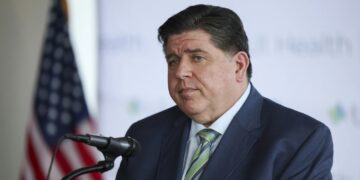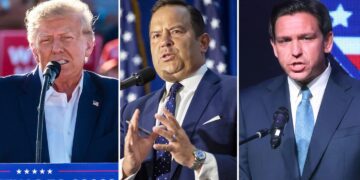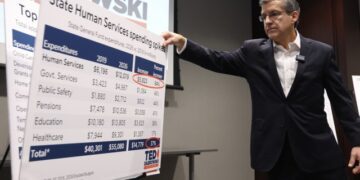A controversial new documentary "Vaxxed: From Coverup to Catastrophe" opens in the Chicago area Friday – and there's a key reason why you won't find positive reviews in major newspapers or on major news stations.
Hint: It's not that in the film a CDC whistleblower reveals information the public shouldn't know.
It's that major drug companies are some of the biggest advertisers and the crucial drug revenue they share with newspapers and news stations comes with strings attached. Strings that prevent media from reporting news negative about drug companies.
Del Bigtree, a medical journalist and co-writer of the film's script, spoke with Illinois Review Friday.
"If your news story is that the pharmaceutical industry and the Centers for Disease Control have colluded, and hidden the fact that they have an effective vaccine that's destroying the lives of children – in this case we have a CDC whistleblower and a top scientist in Dr. William Thompson stepping forward saying "We committed fraud in the MMR-autism study and hid the fact that there's a causal link between the vaccine and autism – how do you think you get that story told?"
"Vaxxed," the film that Robert DeNiro voluntarily pulled from the 2016 Tribeca Film Festival because of the ruckus it stirred, was blasted by the New York Times because the film was produced by Dr. Andrew Wakefield. Dr. Wakefield is a physician that, the paper said, was discredited when his findings about the link between vaccines and autism were retracted by the British Lancet.
The New York Times did not mention that "Vaxxed" focuses almost entirely on the testimony of top CDC scientist Dr. William Thompson – who admits the CDC manipulated research findings to muffle concerns parents might have about the triple measles/mumps/rubella vaccine Dr. Wakefield suggested was key to the explosion of autism over the past several decades.
"It's an incredible moment in American history where we have a top government scientist stepping forward – this man has won awards almost every year he's been at the CDC – he comes forward and says, 'I have to confess, I cannot live with myself any longer, we committed fraud on this MMR – autism study and it put millions of children at risk.' He literally said, 'Every time I see a child with autism I feel guilty because I feel responsible for it,'" Bigtree said. "That is a public statement, and not a single major newspaper or news station covered the story."
And why? One reason is because those same news sources are funded in part by lucrative drug company advertising.
It really isn't that unbelievable to learn that pharmaceutical money affects news coverage. It affects public policy, too.
Drug companies are generous to politicians on either side of the partisan aisle – at federal and state levels.
In 2001, the Illinois General Assembly unanimously passed legislation that would bar anyone from serving on the Illinois Immunization Advisory Committee that accepted funding from pharmaceutical companies. The goal was to minimize interest conflicts when advising the Illinois Director of Public Health on whether new or additional vaccines should be made mandatory.
When members of the Immunization Advisory Committee learned of the impending legislation, they expressed outrage, and called the proposal "ridiculous." One of the infectious disease specialists on the committee declared the legislation to be "un-American and un-democratic," saying it in fact, was "despicable."
"No infectious disease specialist will be able to serve on this committee," he told his colleagues. "We all take money from pharmaceutical companies!"
It was true. The committee members' financial disclosure statements showed they were receiving grants, samples and stock dividends from drug companies.
Soon after the IAC met the governor at the time, George Ryan, was contacted by influential check-writing physicians and medical society devotees who influenced him to veto the bill. To this day, drug company beneficiaries are involved in advising Illinois' mandatory vaccine policy.
And when a vaccine becomes mandatory, federal law protects drug companies from liability concerning the vaccines and any injury connected. Taxpayers fund any civil judgements tied to mandatory vaccines.
The measles-mumps-rubella vaccine is the one Dr. Wakefield and Dr. Thompson claims is tied to autism.
In 1930, autism was unknown. By 1975, the number of autism cases had exploded. In 2014 alone, 1,802,353 new cases were diagnosed and few media sources reported on it, yet that same media intensely covered the 644 cases of measles nationwide attributed to unvaccinated children.
In addition to Dr. Thompson's revelations, the film "Vaxxed" reviews the history of the MMR-autism controversy, and makes a four-part call for action:
- That Congress subpoena Dr. William Thompson and investigate the CDC fraud.
- That Congress repeal the 1985 National Childhood Vaccine Injury Act and hold manufacturers liable for injury caused by their vaccines.
- That the single measles, mumps and rubella vaccines be made available immediately.
- That all vaccines be classified as pharmaceutical drugs and tested accordingly.
Notice, there are no calls to end vaccine distribution, stop development of vaccines or any other radical anti-vaccine proposals.
Instead, "Vaxxed" calls on accountability of the drug companies, transparency of the mandate process and appropriate testing. It calls on Americans to get involved immediately in order to offset an impending autism catastrophe by 2032, when current stats predict a possible one in two children will be affected by autism.
Dr. Thompson's chilling words, "Oh my god. I cannot believe we did what we did. But we did," gives hope that there are still persons with consciences hoping to change the outcome.
See "Vaxxed," decide for yourself what you think about the information and share the controversy with your friends.
It may be the only way they hear about it if the CDC, Big Pharma and Big Media have anything to say about it.
Review by Fran Eaton, editor and co-founder of IllinoisReview.com, a news source founded in 2005.







